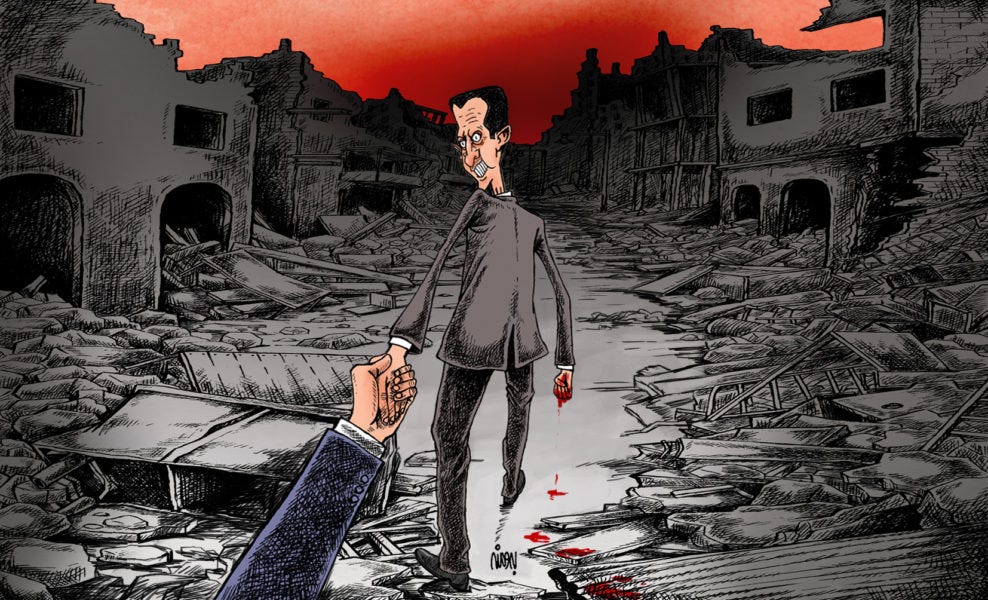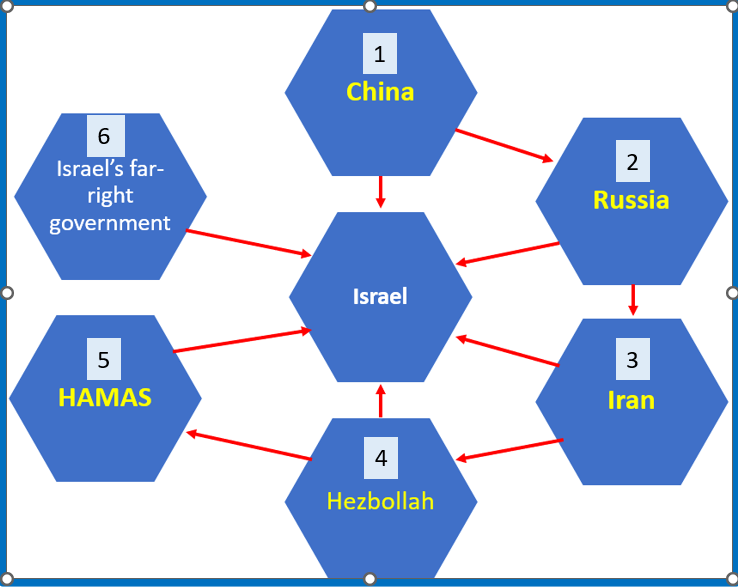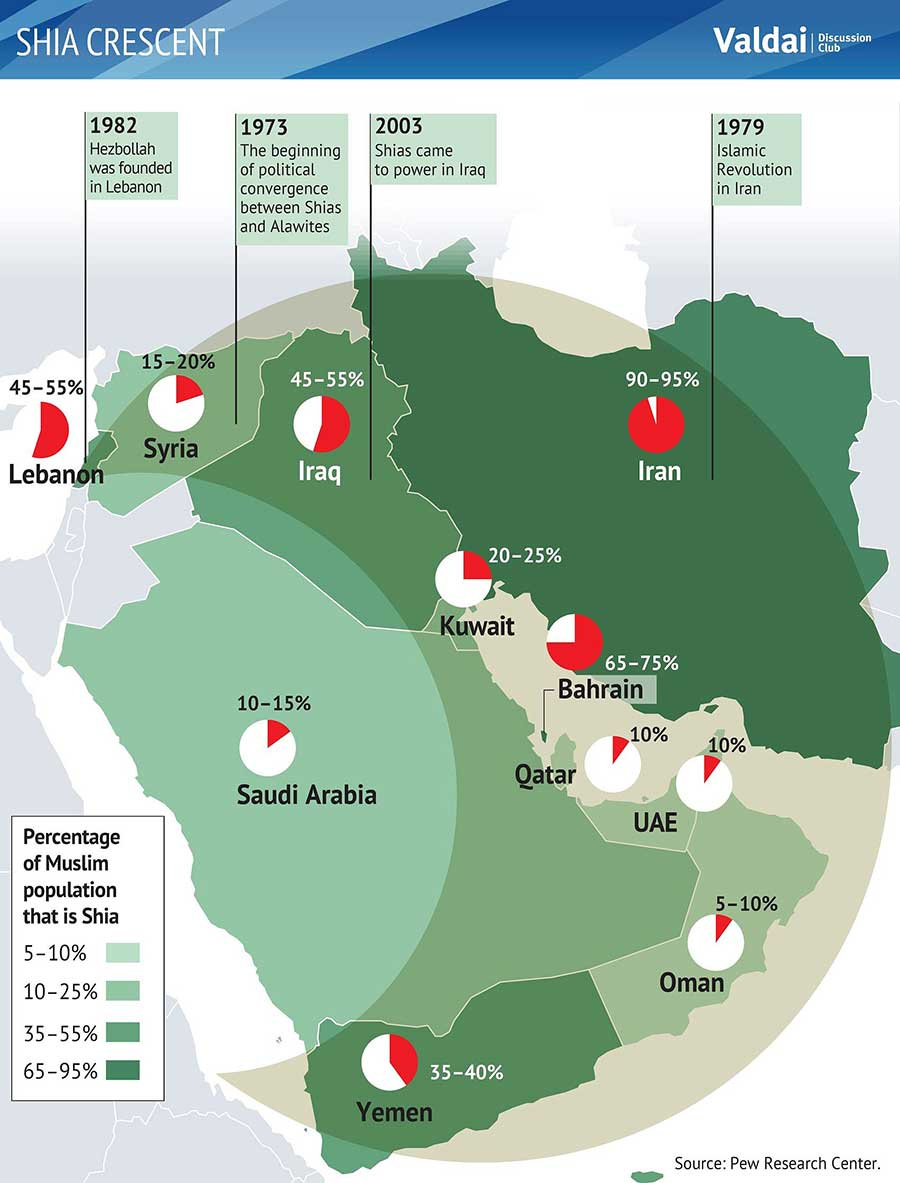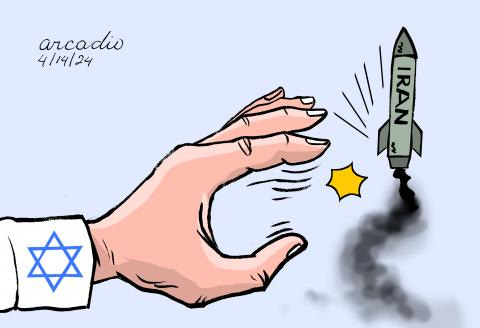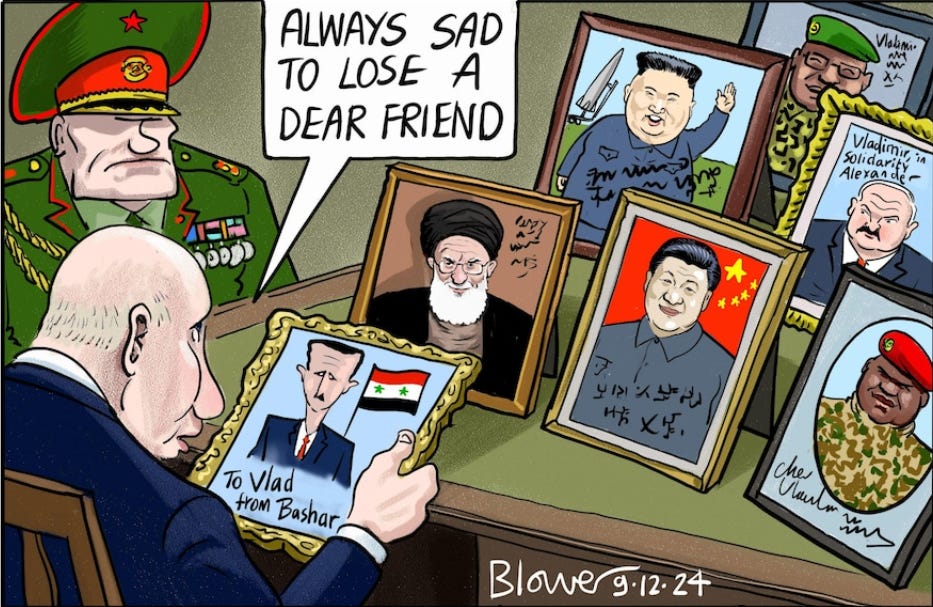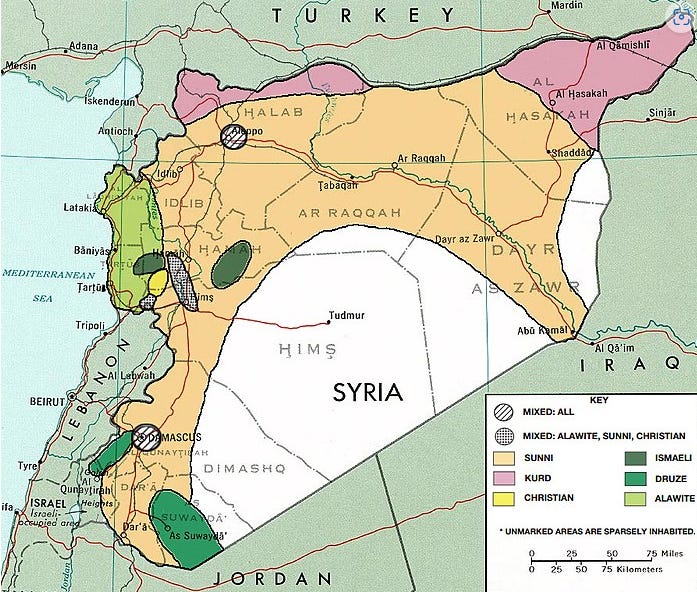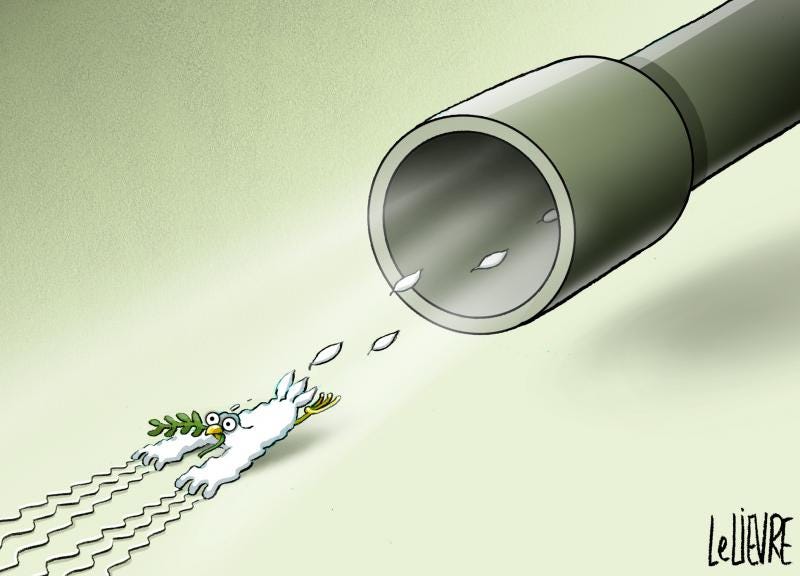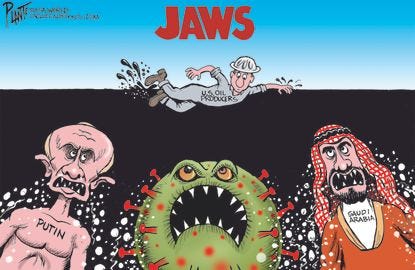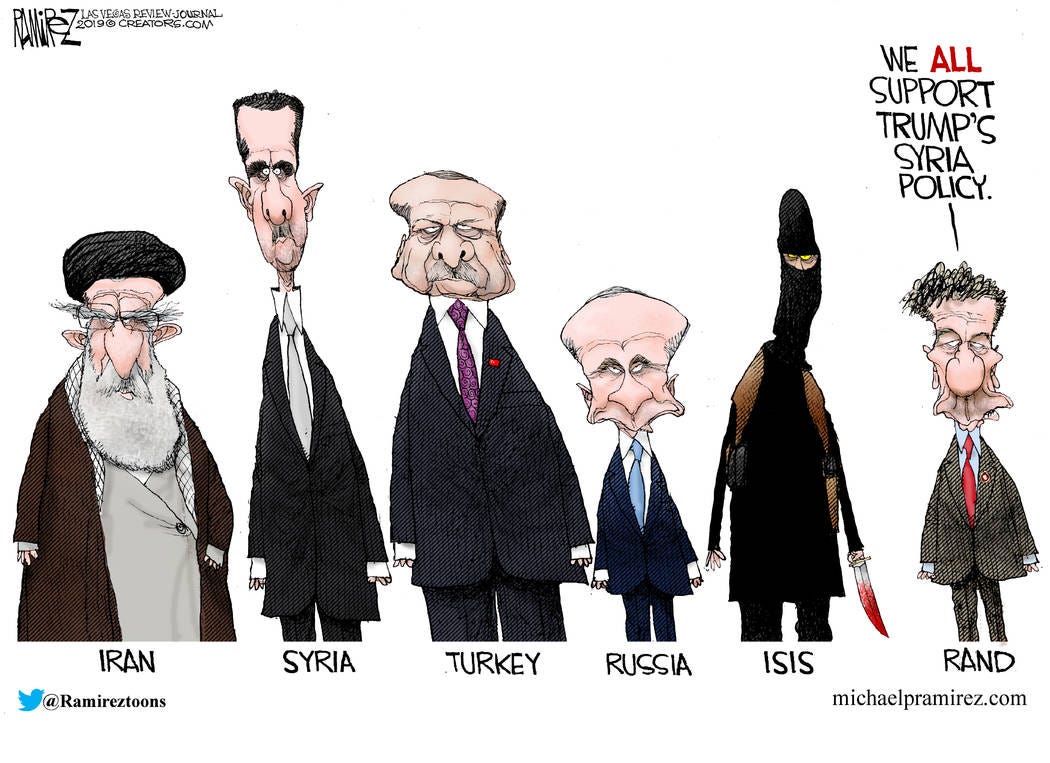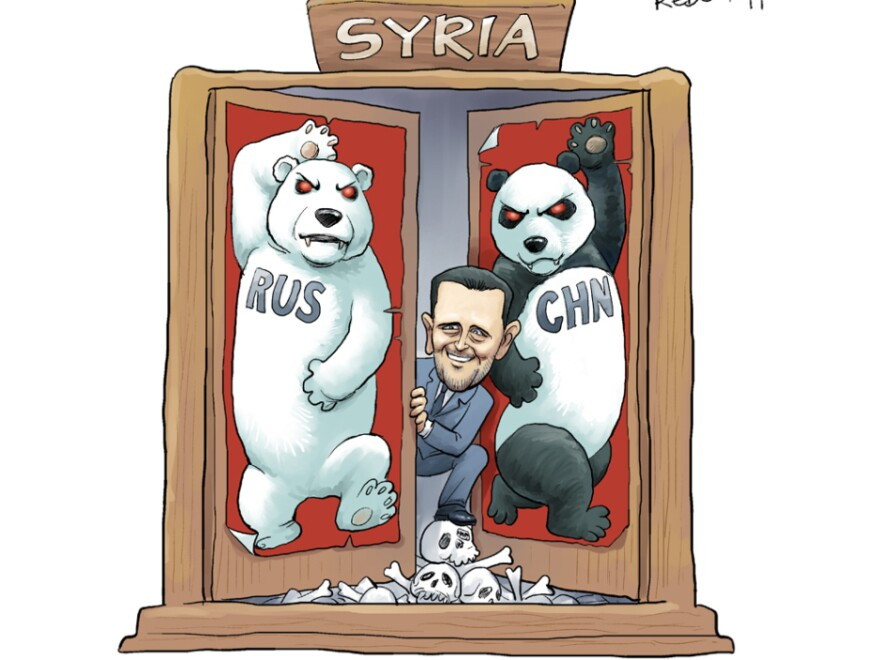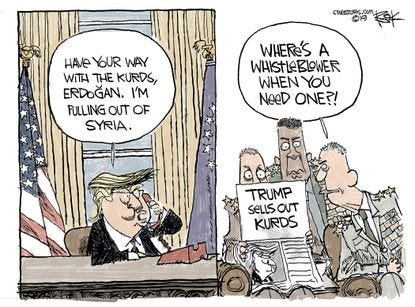Making sense of Assad's demise, Syria, and the region in unpredictable times.
Dear TAT readers,
As we speed headlong towards the end of a crazy year, it would appear that there is little hope for sanity on the horizon. Syria and what comes next, is the perfect example. Although deposing a genocidal dictator like Assad is a good thing, in this case, it could just as easily be, “jumping from the frying pan into the fire.” Like most, I will hang on to a bit of optimism but with my eyes wide open. Today, I put my CT/ counterterrorism hat back on and mostly deviate from our domestic woes, of an incoming Trump regime. In a few ways, these two things are related.
This gets complicated and should I write the entire report, it would require at least one book, a scorecard to keep track of the players and an algorithm to weigh all of the possible outcomes. For these reasons, I will only touch on the major pieces of the puzzle, and the players.
Two graphics that I have created for previous TAT essays, will be very helpful to understanding the basics to this, “onion of countless layers.” The first graphic is a Venn Diagram regarding the largest primary threats to the US and our allies and the second, the six entities I blamed for the war in Gaza, based on my professional analysis.
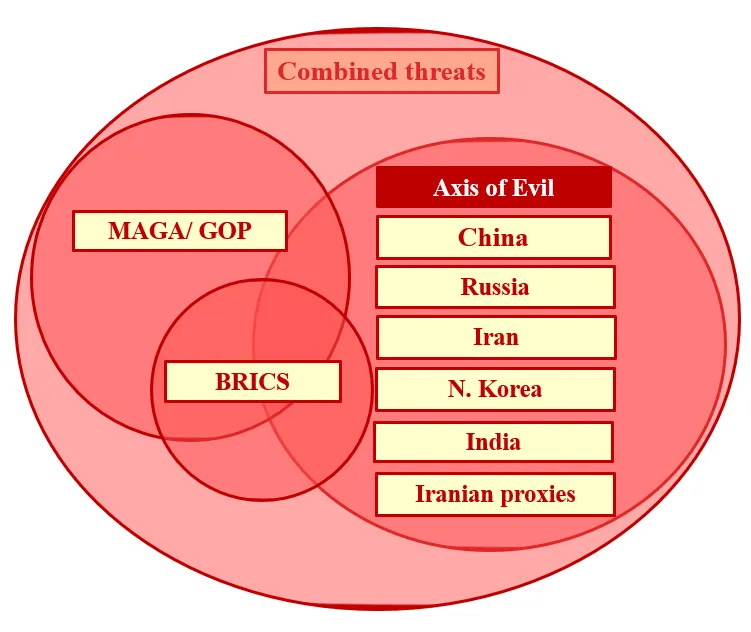
Setting the stage
Assad, the ruthless former president of Syria, responsible for the torture and murder of hundreds of thousands of his own citizens while razing of countless of protected historical sites, is now living in exile, in Russia. The Syrian War beginning in 2011 and was still ongoing had required large-scale Russian and Iranian support simply keep the Assad regime in power. Well, at least until last week, when his government fell to a coalition of Rebel groups and organizations, led by Abu Mohammed al-Jolani. What comes next, is the question on everyone’s mind and there are no easy answers. Nearly any solution will have an impact on global security and not all of these options are good ones, at least for the US and the West.
What has replaced Assad, albeit not uniformly, is a coalition of groups largely defined as Islamist in nature. Some of these groups, like the group of Al-Jolani leads, are quite extremist and are looking to build an Islamist nation on the soil of Syria. To put an exclamation mark on just how Islamist, the US still has a $10 million dollar bounty on the head of Al-Jolani. It won’t be easy to rectify doing business with extremist coalition, due to the fact that not all of the armed groups that have been fighting Assad, are aligned with them. In fact, some like the SDF, which the US and our allies have backed, are enemies of the al-Jolani coalition. Just because most western media call them “rebels, doesn’t mean that they are. They are a mix of freedom fighters and hard-core violent extremists related to some of the worst of the worst terrorist movements like AQ, Al-Nusra, HTS, ISIS etc. All of this matters a great deal to any outcome.
From a geo-political point of view, it is just as complicated. Syria was the Mediterranean end of the so-called, Shia Crescent, in other words, a group of nations and territory controlled or heavily influenced by Iran. On the Southern end are the Houthis in Yemen, who’ve been so much of a problem for international shipping, since the beginning of the war in Gaza. At its zenith which roughly correlates to the summer of 2023, began to crumble shortly after Hamas’ brutal invasion of Israel, October 7th of 2023. Hamas, like Hezbollah is and was, Iranian sponsored, trained and supplied, with contributions from Putin as well.
With the massive losses handed to Hamas and Hezbollah by Israel, Iran lost their proxy forces and hence, their ability to shape events in the region. After all, it had been Iran and their Hezbollah proxy forces that had provided so much support for Assad in stabilizing Syria as Assad’s war droned on. On top of Israel decimating Iran’s proxies, they have also handed Iran significant military losses at home on Iranian soil. In the space of one year, Iran and Putin’s arrogance and potential for troublemaking in the region, has diminished significantly.
China’s BRI/ Belt and Road designs for the Mediterranean also depended a great deal on Iran, the Shia Crescent and the influence it brought the theocratic terrorist regime in Tehran. The BRI is the operational plan for Xi’s China Dream strategy that plans regional hegemony by 2025 and global by 2049.
The Syrian port of Tartus, where until a couple of days ago, the Russian Navy had a significant presence, was a centuries old quest by the Russians and Soviets for a warm-water port. They have long believed this to be essential to their security and commerce. Their only other port not closed to winter sea-ice is Vladivostok, which is not exactly high on the list of being a strategic value.
Then there are the Sunni Gulf States like Saudi Arabia, the UAE, Qatar, Bahrain, Kuwait etc. who have long wielded massive oil revenues for influence in the region. All have small, fairly incompetent militaries and prefer to buy protection from the US and other nations with whom they do business with. They do this primarily, because they also fall within the Shia Crescent where Iran has a relatively large but incompetent military. They also have been enemies for millennia, largely for religious reasons.
Iran may be home base to the Shia Crescent but Sunni Islam, is far greater in size and Saudi Arabia is the historical center for all Islam, especially Sunni Islam. Almost all of the radical Islamist terror organizations such as AQ, ISIS, Al-Nusra, ISKP, Turkmenistan groups, etc. are all Sunni. The bottom line is that there is little love between Iran-based Shia Islam and much larger Sunni Muslims nations. On top of this, comes the issue of oil, one of the most critical requirements of the global economy. Syria’s religious mix is very complicated and diverse. It doesn’t help that the Assad family and much of its ruling class for the past several decades, are Alawite, a syncretic religious group, often aligned with and partially Shia Islam. Seventy percent of Syrians are Sunni and the so-called rebel groups, are almost exclusively Sunni.
The Shia Crescent plays or rather played an important role in the fossil fuel industry, be it production, refining or transport. The world requires the Gulf to remain free and open in order to sustain the global economy. This often makes for interesting and far less than moral partnerships not only in the region, but for just about everyone. China and India despite deep national animosity, are the world’s second and third largest economies and depend heavily on Gulf Oil, just to get through the day. Although the US has long been self-sustaining in production, our prices are built on global models via OPEC.
Everything that happens in the Middle East to the fossil fuel industry, impacts us here in the US. In fact, as I am writing this, the news is reporting a rise in oil prices due to the disruption to Syria’s small oil fields and the delicacy of the geo-political risks discussed in this essay. No country in the world can afford any significant disruption of Gulf oil. It is truly this simple. Hence, with this filter, we need to be very careful how we approach Assad’s demise. In the long run, it matters a great deal.
Aristotle was correct, nature abhors a vacuum
We must remember that the Middle East, has for millennia, been involved in countless wars, and our lifetime is little different. A government or leader will rise and without a dedicated government structure, will fall. The power structures in the region now, are profoundly different than the Middle East of my youth. The Cold War is over, enemies and allies have switched sides, global “spheres of influence” are now changed and not just geo-politically, but in commerce as well. All of these factors and far more, must be accounted for when determining a strategy for resolving power vacuums like the ousting of a long dictatorship, like Assad’s.
What will fill the power vacuum in Syria, is the question of the year. Making predictions about anything geo-political these days, is high-risk at best, disastrous at worst. Who would have predicted that Americans would reelect a traitorous rapist and conman, back to the Oval Office, that Putin would be a global military failure, begging for assistance all over the world and that China’s economy would be little more than smoke and mirrors?
The Gulf oil states are best positioned for success, due largely to having a relationship with some of the “rebel”/ Islamist” movements within Al-Jolani’s coalition. They also would look to the US for assistance. This may or may not offer any real leverage, due to the transactional nature of the incoming Trump administration, who already has deep ties and a history of favors to the Saudis and other oil rich states. This would also be a favor of sorts for Putin due to the high degree of say, that both the Saudis and Russia have in OPEC.
Not only does OPEC + have a strong Russian voice, but Saudi Arabia has also been invited to join the recent BRICS expansion. Although they have not yet decided to join officially, they partially participated at the recent summit and are keeping their options open. I strongly suspect, their decision hinged on who won the US election. Now, with Trump’s fondness for Putin, it would be typical Saudi behavior, to see what Putin described right after election day as, the beginning of a new, “World Order” would shape up. I wrote about this “new world order business last week and see very little geo-politically in such an order that is good for America’s national security or economic health.
Putin may have temporarily lost his naval base at Tartus, but with Gulf Oil states establishing some influence in Syria, he could possibly recover it. Such influence though is far from a sure thing. Turkey, Syria’s northern neighbor plays a key strategic role and there is no love lost between the Saudis and Erdogan of Turkey. Like everything else in the Middle East, the last of appreciation between the Saudis and Turks, goes back more than a thousand years, or more.
Still, the big players in the region are the US, Russia, China and to some extent, even Modi. India has long developed an increasingly close relationship with Israel, mostly for development and commercial reasons. Although India worked on keeping a working relationship with Iran, this has become far more difficult since Hamas’ October 7th massacre of Israelis, in 2023. India, like China cannot afford to not have strong relationships with oil producing nations and so will closely guard their already close ties with both the Saudis and the UAE.
This brings us to China’s interests. Although China had not long ago, announced a strategic partnership with Assad, China is wisely conflict avoidant. So long as they have major rights at Israel’s port of Haifa and controlling interests on both ends of the Suez Canal, they don’t need to support Russia’s recovery of the port of Tartus. Putin has mostly blown up the profitable relationship between Jerusalem and Moscow, so it is not likely that Putin’s warm-water port options in the Mediterranean will improve anytime soon.
As far as the US is concerned, if we do not attempt to play a role in shaping the Syrian future, our most dangerous enemies will. Those enemies, the new, Axis of Evil will take full advantage of one of the most strategically important areas on the globe, and this is where Trump’s inherent inclination towards isolationism, fails badly. Just like he did in 2019 when he pulled us out of northeastern Syria and sold-out our Kurdish allies, a similar decision would leave us at a significant strategic disadvantage.
As noted earlier though, making any strong predictions would be fraught with peril at this time. The only thing that we can say for sure, is that for now, Assad’s notoriously brutal prisons are now being opened and the abused, seeing the light of day for the first time in a decade or longer. Much of Syria is no longer at war and the people will have a chance to potentially mold their own future. Despotism, Terrorist overlords, strategic puppet nation to superpowers, more civil war, or a possible good resolution, are just some of the options awaiting the long-suffering Syrian people. My preference is for peace, stability and security.
Thank you again for inviting me into your email or otherwise, and my very best for the week as most of us get ready for the holidays.
Paul


